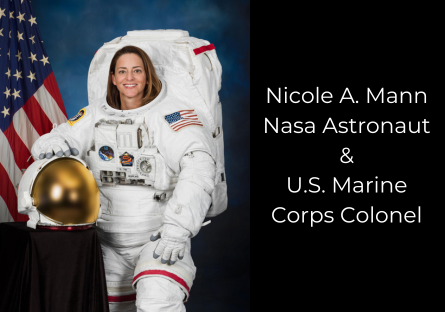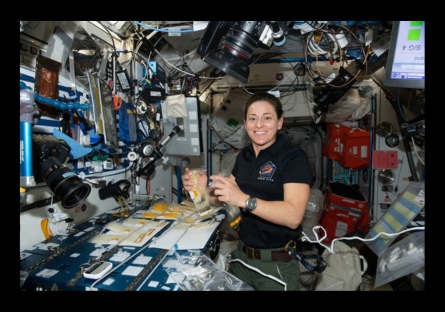

Col. Nicole Mann Spends 157 days on International Space Station
No one could be accused of staring off into space during a special Women’s History Month presentation on March 26 at Estrella Mountain Community College (EMCC). In collaboration with EMCC’s Diversity, Equity, Inclusion, and Access Team and Women's History Month Committee, the college’s STEM Center for Excellence brought Col. Nicole Mann — the first indigenous female astronaut to venture into space — to a packed Performing Arts Center to share her journey of becoming an astronaut, spending six months on the International Space Station, and completing two spacewalks.
The Native American who is registered with the Wailacki of the Round Valley Indian Tribes spoke of growing up in California and knowing early on that she wanted to serve in the military, specifically the Marine Corps.
“I wanted to be a part of something much bigger than myself,” she said. “There was a different sense of honor and tradition that really pulled me to the Marine Corps.”
Launching into space wasn’t yet on her radar, but after a ride in the backseat of an F18 during her senior year at the U.S. Naval Academy, flying a jet was. After earning a Bachelor’s in Mechanical Engineering, she earned a Master’s in Mechanical Engineering with a specialty in Fluid Mechanics and then headed to flight school. Two years later, she was flying combat missions in support of Operations Iraqi Freedom and Enduring Freedom.
“I loved being a fighter pilot, but I missed engineering,” she said.
So she started researching how she could do both, and upon returning home from her second deployment, reported to the United States Naval Test Pilot School where she graduated as an F/A-18 Test Pilot/Project Officer.
“We were flying that aircraft to the edge of the envelope,” she said.
By that point, she knew she wanted to be an astronaut. But when NASA announced it was accepting applications for its next class of astronauts, she was married and pregnant, so she dismissed the idea. But her husband didn’t.
“When I told him I wasn’t going to apply, he couldn’t believe it,” she said, adding that he kept encouraging her and supporting her and promising that it would all work out.
So she applied and was selected, and in 2013, the family moved to Houston so she could begin training for the role of commander of the Crew-5 mission aboard the SpaceX Crew Dragon spacecraft Endurance. Nine short years later, in October 2022, Col. Mann and her crew launched to the International Space Station and spent the next 157 days orbiting the Earth every 90 minutes.
During their mission, they worked with the Soyuz crew and contributed to hundreds of experiments and technology demonstrations, including cardiovascular health, bioprinting, and fluid behavior in microgravity. They completed multiple spacewalks, installing new solar rays and the structure for future solar rays. They also had a lot of fun.
“Living on the station is super fun,” Col. Mann said while showing videos of herself drinking floating balls of water while a fellow crew member played a game of baseball all by himself.
While some astronauts get spacesick due to the lack of gravity, floating came naturally to Col. Mann and she loved it.
“It’s the best sleep I’ve ever gotten,” she said.
The crew returned to Earth, and gravity, on March 11, 2023, and began 45 days of rehab to not only rebuild muscles but also monitor their bodies as they shrank back into place.
“Gravity is so heavy,” she said. “You have no balance, you’re able to walk after about three hours but you’re still wobbly, your head is so heavy.”
The presentation ended with a Q&A session, one of the first questions being, “As an indigenous person, how did you overcome self-doubt?”
Col. Mann said everyone has self-doubts and she finds it helpful to talk to people.
“Sometimes, they're feeling the same thing,” she said. “Ask for help, ask for support when you need it. I had it from my crewmates and the support on the ground.”
She also urged those in attendance to do what they love.
“Every astronaut I’ve met has loved what they did before they became an astronaut and that's really important,” she said. “When you follow your passion, you’re going to be more successful.”
To watch the entire presentation, go to https://www.youtube.com/watch?v=ZPLDjkJQviI.
If you want to be involved in exploring space as a career, EMCC’s Counseling Division provides career counseling, the Career and Transfer Center can help you explore your higher education options, and the Advising Team can help make sure your class selections and plan match up with your goals.